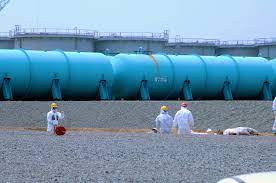IAEA Leads Global Sampling of Fukushima ALPS-Treated Water for Safety Checks
The IAEA continues to stress the importance of international cooperation and public communication in managing the Fukushima discharge.

The International Atomic Energy Agency (IAEA) led a team of international nuclear and environmental experts in a critical mission this week to collect samples of Advanced Liquid Processing System (ALPS)-treated water stored at Japan’s Fukushima Daiichi Nuclear Power Station (FDNPS). The sampling, conducted prior to the water’s planned dilution with seawater and discharge into the ocean, forms part of an ongoing series of enhanced transparency measures aimed at verifying the safety of the discharge process.
This mission marks the fourth round of sampling under the IAEA’s additional verification framework, a system launched in response to global calls for greater transparency and international oversight following the start of Japan’s water discharge operations in August 2023. These expanded measures allow third-party experts to independently assess whether the discharge process remains consistent with international safety standards and environmental protection protocols.
Global Team Conducts Sampling from ALPS Water Tanks
The mission was carried out with the participation of scientists from:
-
Belgium (Belgian Nuclear Research Centre)
-
People’s Republic of China (China Institute of Atomic Energy)
-
Republic of Korea (Korean Institute for Nuclear Safety)
-
Russian Federation (Research and Production Association “Typhoon”)
-
Switzerland (Spiez Laboratory)
-
Japan (Tokyo Electric Power Company Holdings, TEPCO)
-
IAEA (Environmental Laboratories and ALMERA network)
This diverse delegation conducted hands-on sampling of water from tanks designated for the 14th batch of ALPS-treated water scheduled for ocean discharge. Samples were taken prior to dilution with seawater, allowing for a clear analysis of radionuclide concentrations directly after treatment.
Multi-Laboratory Verification Under ALMERA Network
Following collection, the water samples will be analyzed by all participating national laboratories, along with the IAEA’s own laboratories and TEPCO’s in-house facilities. These institutions are all accredited members of the IAEA Analytical Laboratories for the Measurement of Environmental Radioactivity (ALMERA), a global network established to ensure independent, high-quality environmental radioactivity analysis.
The involvement of this robust network of laboratories guarantees that the sampling results meet the highest international scientific standards and enhances confidence in the data’s accuracy and impartiality.
Timeline and Broader Verification Efforts
This latest sampling mission follows three earlier field efforts:
-
February 2024: IAEA Director General Rafael Mariano Grossi personally oversaw the collection of seawater samples from the vicinity of FDNPS, ensuring regional marine safety and public confidence.
-
April 2024: Sampling of diluted water immediately before ocean discharge, to verify final composition post-dilution.
-
October 2023: Initiation of additional transparency measures, including regular international participation and public reporting.
Each mission adds a critical layer of oversight to Japan’s process of discharging ALPS-treated water from the Fukushima site, a key component of its long-term decommissioning strategy for the damaged plant following the 2011 tsunami and nuclear accident.
ALPS and Environmental Safety
The ALPS system is designed to remove most radioactive contaminants from the water used to cool damaged reactor cores at Fukushima. The primary remaining radionuclide, tritium, is considered less hazardous in diluted form, but the process has nonetheless prompted concerns from regional neighbors and global environmental stakeholders.
By conducting independent, multi-phase sampling of both pre-dilution and post-dilution water, as well as seawater in the discharge zone, the IAEA seeks to demonstrate scientific transparency and environmental accountability in Japan’s approach to the complex and long-term challenge of nuclear decommissioning.
Looking Ahead: Trust Through Science and Collaboration
The IAEA continues to stress the importance of international cooperation and public communication in managing the Fukushima discharge. Future missions are expected to maintain the current frequency of sampling and verification, ensuring ongoing compliance with global safety norms.
“These collaborative efforts strengthen the foundation of trust, science, and transparency that are essential for managing environmental concerns surrounding nuclear energy,” said an IAEA spokesperson.
As global attention remains focused on the integrity of the Fukushima water discharge program, the IAEA’s leadership in organizing international, multi-laboratory verification will be central to scientific assurance and stakeholder engagement.










